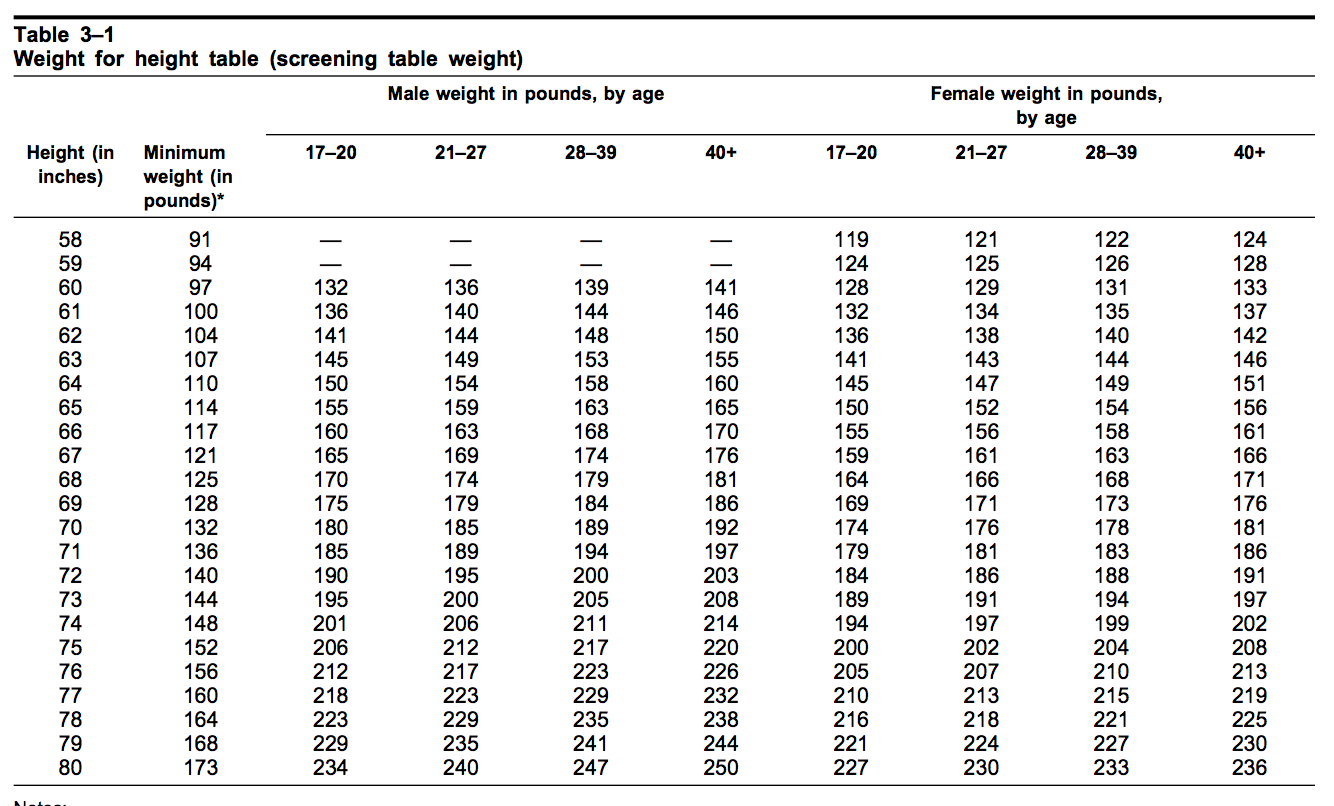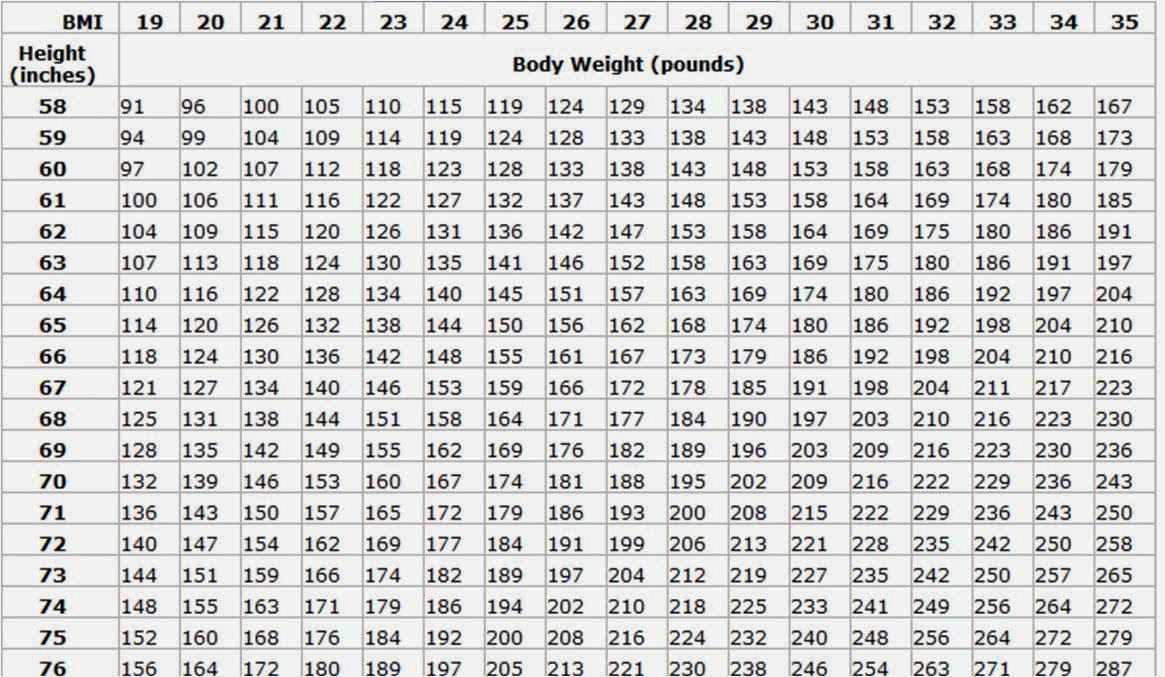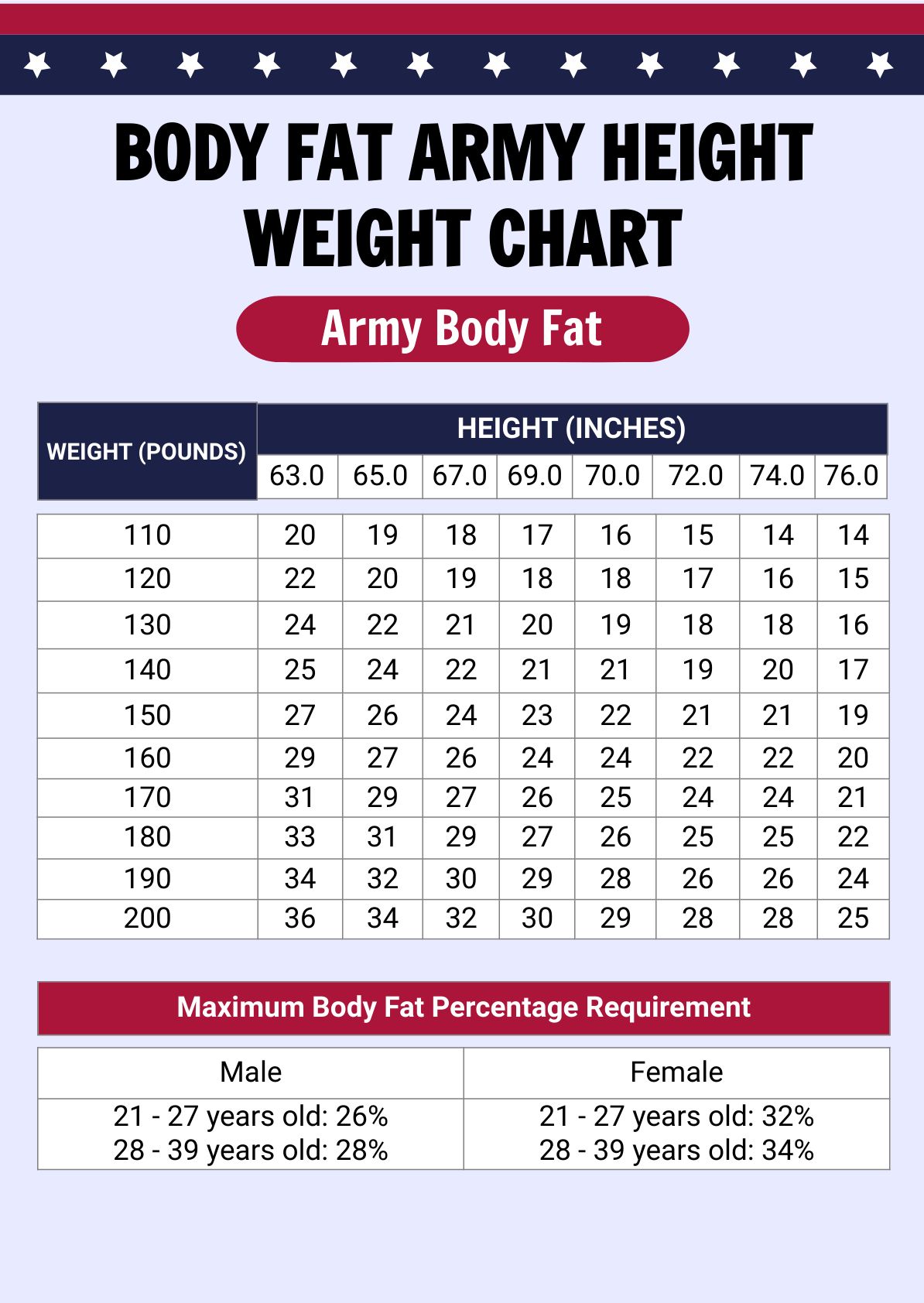What are the army height and weight standards for 2024? These standards are important for ensuring that soldiers are able to meet the physical demands of military service.
The army height and weight standards are based on a body mass index (BMI) calculation. BMI is a measure of body fat based on height and weight. The BMI range for acceptable weight is 17.5 to 24.9. Soldiers who are outside of this range may be required to lose or gain weight in order to meet the standards.
The army height and weight standards have been in place for many years and have been shown to be effective in ensuring that soldiers are able to meet the physical demands of military service. However, the standards have also been criticized for being too strict and for discriminating against certain groups of people, such as women and minorities.
In recent years, there have been several attempts to change the army height and weight standards. In 2013, the army proposed a new set of standards that would have allowed soldiers to have a higher BMI. However, this proposal was met with opposition from some members of Congress and was ultimately withdrawn.
Army Height and Weight Standards 2024
The army height and weight standards are important for ensuring that soldiers are able to meet the physical demands of military service. These standards are based on a body mass index (BMI) calculation, which is a measure of body fat based on height and weight. The BMI range for acceptable weight is 17.5 to 24.9.
- Objective: The standards are designed to ensure that soldiers are able to meet the physical demands of military service.
- Science-Based: The standards are based on a body mass index (BMI) calculation, which is a measure of body fat based on height and weight.
- Health-Focused: The standards are designed to promote the health and well-being of soldiers.
- Mission-Critical: Soldiers who are unable to meet the standards may be unable to perform their duties effectively.
- Fair and Equitable: The standards are applied fairly and equitably to all soldiers, regardless of gender, race, or ethnicity.
- Adaptable: The standards are reviewed and updated regularly to ensure that they are consistent with the latest scientific evidence and the needs of the Army.
- Supportive: The Army provides resources and support to help soldiers meet the standards.
The army height and weight standards are essential for ensuring that soldiers are able to meet the physical demands of military service. These standards are based on sound science and are designed to promote the health and well-being of soldiers. The standards are applied fairly and equitably to all soldiers, and the Army provides resources and support to help soldiers meet the standards.
Objective
The army height and weight standards are designed to ensure that soldiers are able to meet the physical demands of military service. This is important because soldiers who are unable to meet the standards may be unable to perform their duties effectively. For example, a soldier who is overweight may not be able to carry a heavy pack or march long distances. A soldier who is underweight may not be strong enough to lift heavy objects or engage in combat.
The army height and weight standards are based on a body mass index (BMI) calculation, which is a measure of body fat based on height and weight. The BMI range for acceptable weight is 17.5 to 24.9. Soldiers who are outside of this range may be required to lose or gain weight in order to meet the standards.
The army height and weight standards are essential for ensuring that soldiers are able to meet the physical demands of military service. These standards are based on sound science and are designed to promote the health and well-being of soldiers. The standards are applied fairly and equitably to all soldiers, and the Army provides resources and support to help soldiers meet the standards.
Science-Based
The army height and weight standards are based on a body mass index (BMI) calculation, which is a measure of body fat based on height and weight. This is important because BMI is a scientifically validated measure of body fat that is associated with a number of health risks, including obesity, heart disease, and diabetes. By using BMI to set its height and weight standards, the army is ensuring that soldiers are at a healthy weight and are less likely to develop these health problems.
For example, a study published in the journal JAMA Internal Medicine found that soldiers who were overweight or obese were more likely to be injured during training and deployment. Another study, published in the journal Military Medicine, found that overweight and obese soldiers were more likely to be discharged from the military for medical reasons.
These studies show that the army height and weight standards are based on sound science and are essential for ensuring the health and well-being of soldiers.
Health-Focused
The army height and weight standards are designed to promote the health and well-being of soldiers. This is important because soldiers who are at a healthy weight are less likely to develop chronic diseases, such as obesity, heart disease, and diabetes. They are also more likely to be able to perform their duties effectively and to recover from injuries quickly.
For example, a study published in the journal JAMA Internal Medicine found that soldiers who were overweight or obese were more likely to be injured during training and deployment. Another study, published in the journal Military Medicine, found that overweight and obese soldiers were more likely to be discharged from the military for medical reasons.
These studies show that the army height and weight standards are essential for ensuring the health and well-being of soldiers. By promoting a healthy weight, the standards help soldiers to stay healthy and to perform their duties effectively.
Mission-Critical
The army height and weight standards are mission-critical because they ensure that soldiers are able to perform their duties effectively. This is important because soldiers who are unable to meet the standards may be unable to carry heavy equipment, march long distances, or engage in combat.
For example, a study published in the journal JAMA Internal Medicine found that soldiers who were overweight or obese were more likely to be injured during training and deployment. Another study, published in the journal Military Medicine, found that overweight and obese soldiers were more likely to be discharged from the military for medical reasons.
These studies show that the army height and weight standards are essential for ensuring that soldiers are able to perform their duties effectively. By promoting a healthy weight, the standards help soldiers to stay healthy and to perform their duties effectively.
In conclusion, the army height and weight standards are mission-critical because they ensure that soldiers are able to perform their duties effectively. These standards are based on sound science and are essential for ensuring the health and well-being of soldiers. The standards are applied fairly and equitably to all soldiers, and the Army provides resources and support to help soldiers meet the standards.
Fair and Equitable
The army height and weight standards are applied fairly and equitably to all soldiers, regardless of gender, race, or ethnicity. This is important because it ensures that all soldiers are held to the same standards and that no one is discriminated against. It also helps to create a more cohesive and inclusive Army.
In the past, there have been some concerns that the army height and weight standards were not applied fairly to all soldiers. For example, some studies have shown that female soldiers are more likely to be discharged from the military for failing to meet the height and weight standards than male soldiers. However, the Army has taken steps to address these concerns and to ensure that the standards are applied fairly to all soldiers.
The army height and weight standards are an important part of ensuring that all soldiers are able to meet the physical demands of military service. The standards are based on sound science and are applied fairly and equitably to all soldiers. This helps to create a more cohesive and inclusive Army and ensures that all soldiers are able to perform their duties effectively.
Adaptable
The army height and weight standards are adaptable because they are reviewed and updated regularly to ensure that they are consistent with the latest scientific evidence and the needs of the Army. This is important because the science of body composition and weight management is constantly evolving, and the Army needs to ensure that its standards are based on the most up-to-date information.
For example, in 2013, the Army updated its height and weight standards to include a new body fat measurement. This change was made based on research that showed that body fat is a better predictor of health and fitness than weight alone. The new standards also took into account the changing demographics of the Army, which is becoming increasingly diverse.
The army height and weight standards are an important part of ensuring that soldiers are able to meet the physical demands of military service. By reviewing and updating the standards regularly, the Army can ensure that they are based on the latest scientific evidence and that they meet the needs of the Army.
Supportive
The Army is committed to helping soldiers meet the height and weight standards. This is important because the standards are essential for ensuring that soldiers are able to meet the physical demands of military service. The Army provides a variety of resources and support to help soldiers meet the standards, including:
- Nutritional counseling: The Army offers nutritional counseling services to help soldiers make healthy eating choices and develop a personalized weight management plan.
- Physical training programs: The Army offers a variety of physical training programs to help soldiers improve their fitness and lose weight.
- Body composition analysis: The Army offers body composition analysis services to help soldiers track their progress and make adjustments to their weight management plan as needed.
- Medical support: The Army provides medical support to help soldiers who are struggling to meet the standards. This may include medical treatment for underlying health conditions that are contributing to weight gain.
The Army's commitment to helping soldiers meet the height and weight standards is essential for ensuring that soldiers are able to meet the physical demands of military service. The resources and support that the Army provides can help soldiers achieve their weight loss goals and improve their overall health and fitness.
Frequently Asked Questions about Army Height and Weight Standards 2024
The Army height and weight standards are designed to ensure that soldiers are able to meet the physical demands of military service. The standards are based on a body mass index (BMI) calculation, which is a measure of body fat based on height and weight. The BMI range for acceptable weight is 17.5 to 24.9.
Question 1: What are the consequences of not meeting the army height and weight standards?
Answer: Soldiers who do not meet the army height and weight standards may be subject to a variety of consequences, including being placed on a weight loss program, being restricted from certain duty assignments, or being discharged from the military.
Question 2: How can I prepare for the army height and weight standards?
Answer: The best way to prepare for the army height and weight standards is to start eating a healthy diet and exercising regularly. You should also talk to your doctor to make sure that you are healthy enough to meet the standards.
Question 3: What are some tips for losing weight to meet the army height and weight standards?
Answer: Some tips for losing weight to meet the army height and weight standards include eating a healthy diet, exercising regularly, and drinking plenty of water. You should also talk to your doctor or a registered dietitian for personalized advice.
Question 4: What are some tips for gaining weight to meet the army height and weight standards?
Answer: Some tips for gaining weight to meet the army height and weight standards include eating a healthy diet, exercising regularly, and drinking plenty of fluids. You should also talk to your doctor or a registered dietitian for personalized advice.
Question 5: What are some common misconceptions about the army height and weight standards?
Answer: Some common misconceptions about the army height and weight standards include the belief that the standards are too strict, that they are unfair to women and minorities, and that they are not based on science. However, the standards are based on sound science and are designed to ensure that soldiers are able to meet the physical demands of military service.
Question 6: Where can I find more information about the army height and weight standards?
Answer: You can find more information about the army height and weight standards on the Army's website or by talking to your recruiter.
Summary of key takeaways or final thought: The army height and weight standards are an important part of ensuring that soldiers are able to meet the physical demands of military service. The standards are based on sound science and are designed to promote the health and well-being of soldiers. If you are considering joining the Army, it is important to start preparing for the height and weight standards as early as possible.
Transition to the next article section: The army height and weight standards are just one part of the Army's overall fitness program. The Army also offers a variety of other programs and resources to help soldiers stay healthy and fit. To learn more about these programs, visit the Army's website or talk to your recruiter.
Conclusion
The army height and weight standards are an important part of ensuring that soldiers are able to meet the physical demands of military service. The standards are based on sound science and are designed to promote the health and well-being of soldiers. The standards are applied fairly and equitably to all soldiers, and the Army provides resources and support to help soldiers meet the standards.
The army height and weight standards are essential for ensuring that soldiers are able to perform their duties effectively and remain healthy. By adhering to the standards, soldiers can help to ensure the readiness of the Army and the safety of our nation.
The Ultimate Guide To The Intriguing Thumb People In Spy Kids
Where Is Sharon Murphy Now: Uncovering Her Current Whereabouts
Exhilarating Kathd Kdrama: A Captivating Journey


